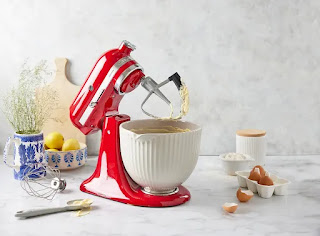Juicers vs. Kitchen Spiralizers: Which One is Right for You?
In the quest for a healthier lifestyle, many of us turn to our kitchens to prepare nutritious meals and snacks. Two popular kitchen gadgets that have gained immense popularity in recent years are juicers and kitchen spiralizers. These devices are excellent tools for incorporating more fruits and vegetables into your diet, but they serve different purposes. In this blog, we'll delve into the differences between juicers and kitchen spiralizers, helping you decide which one is right for you.
The Juicer: A Gateway to Fresh, Liquid Nutrition
Juicers are the go-to appliance for those who want to enjoy the benefits of fruits and vegetables in a liquid form. These machines work by extracting the juice from produce while separating it from the fiber, producing a smooth, nutrient-packed beverage. There are two main types of juicers on the market: centrifugal and masticating (or cold press) juicers.
Centrifugal Juicers: These are the most common and affordable juicers. They work by using a fast-spinning blade to shred the fruits and vegetables and then separate the juice from the pulp. They are quick and easy to use, making them a great choice for those with busy lifestyles. However, they can generate heat during the juicing process, potentially leading to some nutrient loss.
Masticating (Cold Press) Juicers: These juicers use a slow, squeezing mechanism to extract juice from produce. They operate at lower speeds, which minimizes heat generation and reduces nutrient degradation. Cold press juicers are known for their ability to extract a higher yield of Vitamix blender and preserve more nutrients, but they tend to be more expensive.
The Kitchen Spiralizer: Unleashing the Magic of Veggie Noodles
Kitchen spiralizers are ideal for those who want to add more vegetables to their diet in a fun and creative way. These devices transform fruits and vegetables into spiral or noodle-like shapes, making them a versatile addition to various dishes. Spiralizers come in several types, including handheld spiralizers, countertop models, and attachment accessories for stand mixers.
Handheld Spiralizers: These compact and affordable tools are perfect for occasional use and easy storage. They work by manually twisting the produce through a blade, creating spirals or ribbons. Handheld spiralizers are great for making zucchini noodles (zoodles), cucumber ribbons, and more.
Countertop Spiralizers: These electric or hand-cranked machines offer more versatility and power. They can spiralize a wide range of vegetables and fruits quickly and efficiently. Countertop spiralizers are perfect for those who plan to use them frequently.
Attachment Spiralizers: If you already own a stand mixer, you can purchase a spiralizing attachment to get more out of your existing appliance. These attachments are convenient and versatile, allowing you to create various shapes and sizes of vegetable noodles.
Choosing the Right Tool for Your Kitchen
To determine whether a juicer or a kitchen spiralizer is the right fit for your kitchen, consider your dietary preferences and lifestyle. Here are some key factors to consider:
Dietary Goals: If you want to increase your intake of fresh fruit and vegetable juices, a juicer is the obvious choice. It's an efficient way to consume a wide range of nutrients quickly. On the other hand, if you're focused on reducing your carb intake or incorporating more vegetables into your meals, a spiralizer will be more beneficial.
Convenience: Juicers, especially centrifugal ones, are quicker to use and clean, making them ideal for busy individuals. Spiralizers may require more time and effort for preparation and cleanup.Budget: Juicers can vary widely in price, with centrifugal models being more budget-friendly. Spiralizers, particularly countertop models, tend to be moderately priced. Consider your budget and how often you plan to use the device.
Kitchen Space: Take into account the available space in your kitchen. Juicers can be bulky, while spiralizers come in various sizes, including compact handheld versions.
Versatility: Spiralizers offer more culinary creativity, allowing you to experiment with different vegetable and fruit-based dishes. Juicers are more specialized in producing beverages.
conclusion
The choice between a juicer and a kitchenaid spiralizer depends on your specific health goals, dietary preferences, and kitchen setup. While both devices contribute to a healthier lifestyle, they serve different purposes. Some health enthusiasts even opt to have both in their kitchen arsenal, enjoying the best of both worlds.
No matter which device you choose, the most important thing is that you're making an effort to incorporate more fruits and vegetables into your diet. Both nama juicers and kitchen spiralizers can be valuable additions to your kitchen, helping you on your journey toward a healthier and more vibrant life.




Comments
Post a Comment